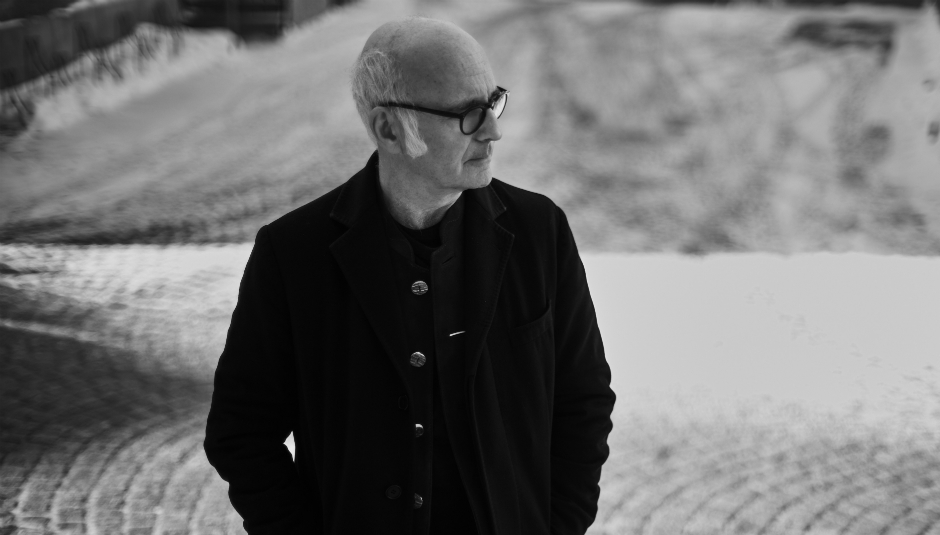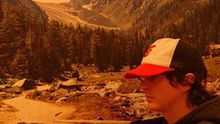We’ve stopped briefly on our walk through the Italian countryside, on the way to a local restaurant, because Ludovico Einaudi wants to eat some flowers. He beckons the press over and begins to speak about the qualities of this particular specimen, encouraging us to pick a few to garnish our salads and risottos later. Various members of the international press in attendance begin collecting them, stuffing a handful in pockets and the occasional one or two in their mouths. I chew on a few petals and watch as the composer sets off again, down the road to find the next adventure. Are they poisonous? Nobody asks. Today Einaudi is the pied piper of Piedmont, and we follow him wherever he takes us.
As it turns out the 63-year-old is an excellent walking companion, which is exactly what makes his new album cycle Seven Days Walking such a compelling work of art. Inspired by a succession of mountain walks taken during the darker months, the project is intended to illustrate the capricious nature of both the environment around us and our perception of it, each subject to change at any moment, however much we grasp at commonalities. If it sounds like the work of an experimental artist on the fringes of modern classical music, that may belie the fact that Ludovico Einaudi is something of a superstar – well beyond the remit of where his genre typically extends.
If you’re not familiar with the name, you’ll nonetheless be well acquainted with his music. Unusually, Greg James started playing his track ‘I Giorni’ on Radio 1 in June 2011, eventually leading to a Live Lounge performance. It wasn’t the start of Einaudi’s fame, though it may well be regarded as a significant catalyst in moving him into popular consciousness, especially among younger listeners. This Is England and its TV off-shoots have featured emotional contributions from the Italian. Dramatic moments on The X Factor have typically been bolstered by a blast of Einaudi. Nicki Minaj is famously a fan, and has walked on stage to his music in the past.
The first time we meet at the Poderi di Luigi Einaudi – the hotel and accompanying vineyard owned by the artist and named after his grandfather, who was President of Italy between 1948 and 1955 – it’s a gloriously sunny day, worlds away from the icy scenes depicted in the Seven Days Walking cycle. The previous night, just after the first installment ‘Day One’ has been released, we had watched as he and two other musicians had performed the songs live in an unusually designed theatre in nearby Alba, where the stage is flanked by audiences either side. Naturally, it didn’t phase the maestro. “It doesn’t change so much when we’re performing; we are in our black dimension, so we don’t have that perception of the stage dynamic,” he explains. “Only when we receive the applause.”
The applause comes thick and fast, though there’s an undeniable chill to the new music, as if some of those icy mountain winds got caught in the recording. He’s finished the first six ‘days’ now (an album-length release for each), with the seventh to be a solo recording. “I purposely decided to wait a bit to provide a natural evolution, to give it a bit more space between the others and see if different ideas on the variation arrive in that time,” he says. “Since I’m doing it solo, I want there to be more distance, more space, to think more about it.”
The rest were recorded between September and the beginning of November 2018, between a studio in Germany and London’s Air Studios, a space including a church venue which he describes as “beautiful”. I tell him about the intense sadness I felt in the new music, and wonder if there was a conscious melancholy in the process.
“It felt like a moment of turbulence,” he offers instead, “because I arrived to compose this after three years of performing another project that was completely different, with more musicians and more production. I had the feeling that I wanted to change completely and explore a situation where there was a sort of continuum, a continual line of music without too many breaks, possibly with no breaks. Exactly like when you are walking from one place to another; of course you have certain topical places that you walk by, but it remains a continuous movement, which perhaps connects a bit more with the tradition of classical music in form.”
Seven Days Walking works around several string motifs as well as Einaudi’s piano. Maybe it’s the snowy accompanying promo video, but the quiet, anxious violin coda that moves through ‘Low Mist Var. 2’ seems to evoke a sense of loss, whether of light, life, or simply direction. For Einaudi, there was some comfort in that void: “Of course when you start to search for something, your mind is not so clear at the beginning; you feel sometimes that you won’t achieve what you have in mind, that it could be difficult.” After busying himself with a high-production show, there was a relief in not knowing what might come next. “Being there in the mountains with all this snow in front of me, made me feel that I was in the right place, because my mind was in a similar place to the landscape I was experiencing outside.”
It seems that process transferred to the recording process. “About 5km from here,” he gestures out across the rolling fields and vineyards, “I have a house, and I invited the two musicians that you saw playing with me last night. I said to them, ‘I don’t want to say too much, because I’m not sure where the music will go. But you have to listen to me, and follow me like we were out walking. You are experiencing this route with me. Let’s try that for fifteen minutes and see how it goes.’”
The result was several different recordings of the same piece of music; normally the stage at which editing begins. “But when I sat down to listen to them all I found it difficult to choose, because there is beauty in each one of them. So I said, 'Instead of deciding, why decide to chop something off? Why don’t we embrace them all? It’s how I live and create the music, and I think it would be beautiful for my audience to be with me in this process.'” Suddenly, every slight variation in the natural scene of the walk became cause for curiosity. “One day you notice that the wind is blowing and the birds are flying, and another day the light is different and you look at the mountains.”
Einaudi grew up in a musical family: his mother would sit and teach him piano, introducing him to classical music, while his father was, in turn, an opera conductor and a composer. Nonetheless, the household was alive to the new sounds arriving at the time. “She was very open when it came to music,” Einaudi recalls of his mother. “I remember one day she played me the Rolling Stones. I also had an older sister who introduced me to the Beatles, Jimi Hendrix… so I’ve listened to a lot of different styles of music since I was a child.”
It must have felt like quite a revolutionary time, I say. “Yeah, there was a huge revolution in the way that people were thinking, looking at things,” he nods in agreement. “It was a very colorful time to live. In ’68 I was 13 years old, so I was a child, but I felt a lot of excitement in listening to things, looking at the pop art coming over from America. My father was an art collector, and he was coming home with these strange pieces of art that weren’t exposed in museums. At the time it was quite revolutionary, very adventurous. I always get excited by the idea of adventure, of doing something different…”
Does he see any new revolutions on the horizon? “What I miss today is…” Einaudi pauses and looks out across the window. “I feel today, with all the possibilities we have in our hands, all the new technology at our disposal, everything is becoming obvious. Nothing is surprising. You can see beautiful things on Instagram, but there is something that doesn’t touch you deeply. Everything is normal, while there’s nothing that grabs you and turns you upside down.”
A few hours later the wine is flowing over lunch, and he laughs and tells stories and throws wild garnishes over his food in the way that Einaudi does. These are ordinary moments for him, ones that he’s acted out a few thousand times before, and perhaps will another thousand times more. But they remain touched by adventure. “It’s sad because I think in those decades of my youth, sometimes the ideas were crazy, but you could feel something deeply revolutionary inside,” he tells me towards the end of our allotted time. “It makes me a bit sad because I desire more of that.” Einaudi remains restlessly creative, always seeking out a different angle or a change in atmosphere, even as he perceives a world around him that has become lost in a screen of snowy static.
The flowers were delicious, though.
Seven Days Walking (Day One) is out now via Universal. For more information on Ludovico Einaudi, including forthcoming tour dates, please visit his official website.
Photo Credit: Ray Tarantino























